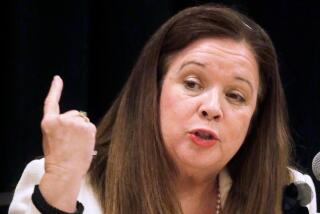Judge Rules Witness ‘Hostile’
A federal judge declared a former city official hostile to prosecutors Tuesday, an unusual move that gives them more freedom to question him about overbilling by one of the nation’s largest public relations firms.
The testimony of Eric Moses, a top aide to former Mayor Richard Riordan and once a writer for the Los Angeles Daily News, drew the ire of U.S. District Judge Gary A. Feess, who is presiding over the trial.
It was a flutter of drama that momentarily broke a succession of testimony focusing on dozens of billing documents. They are the backbone of the fraud and conspiracy case against Douglas Dowie, once a political power broker and former Daily News managing editor, and John Stodder, who was his deputy. Both helped build the Los Angeles office of Fleishman Hillard Inc., often by winning government consulting contracts.
Dowie, who once earned $330,000 a year and was a confidant of former Mayor James K. Hahn, alleges that his employer fired him to cover up a scheme to funnel illegal political contributions. The firm has acknowledged overbilling the city and repaid city agencies almost $6 million to settle a lawsuit. The firm said Dowie’s allegation is an attempt to extort money from the St. Louis-based firm.
Feess intervened shortly after Moses testified that his superiors urged him to bill the value of his services, rather than the hours he worked. The firm’s contracts with the Port of Los Angeles and the Department of Water and Power called for hourly billing, according to allegations in the court file.
Moses is scheduled to continue testifying today under the judge’s declaration that he is a hostile witness, which gives prosecutors more latitude in their questions.
Prosecutors allege that Fleishman officials regularly inflated bills, in particular on the DWP’s $3-million annual contract.
Moses testified that he “might have once” billed on a “value” basis over the 18 months he worked at Fleishman-Hillard, ending in January 2003. “I felt fairly uncomfortable about doing it,” he said.
Moses, under questioning by Assistant U.S. Atty. Cheryl O’Connor Murphy, identified bills to the city in which the hours he worked were inflated. He said he honestly reported his hours, then said someone had “written up” the bills to include hours he had not worked.
One bill listed an hour of work for a conference with Stodder on Jan. 10, 2003, when Moses was on vacation, he testified.
But Moses denied that Stodder had told him to add hours to his billings.
In a short hearing after jurors were dismissed for the day, Feess called Moses unresponsive and recalcitrant.
More to Read
Sign up for Essential California
The most important California stories and recommendations in your inbox every morning.
You may occasionally receive promotional content from the Los Angeles Times.










